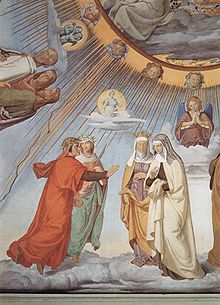Wikipedia Trail: Divine Comedy to Catholic Emancipation
For this week’s Wikipedia Trail, I decided to start with the
Wikipedia page, “Divine Comedy” in order to get more background information
upon the story that I read this week. I’ve always wanted to more detail within
the story, which the summary provided through Wikipedia provided. The long poem,
itself, is somewhat unwieldy to read, so getting a clearer picture through this
was definitely nice.
The next page that I was led to was, “Seven deadly sins”
which I have always found interesting. Part of the reason why is because so
many stories that I’ve read have personified these sins, making them stand out
even more. I’m not sure which one of them I find to be the worst – probably wrath
since murder is pretty terrible. It was really cool seeing how old the ideas of
the sins are – being from way before Dante’s time really puts a perspective on
how old some of Christianity’s beliefs are.
The third page that I stumbled upon was, “Edmund Burke”. I
just randomly clicked on his name when I saw a cool quote that he spoke, “No
man, who is not inflamed by vain-glory into enthusiasm, can flatter himself
that his single, unsupported desultory, unsystematic endeavors are of power to
defeat the subtle designs and united Cabals of ambitious citizens.” According
to wiki, Burke was a big proponent of having manners and good virtues within
society, especially how churches can point people in the appropriate moral
direction. To me, it is always crazy seeing how old idea are still highly
relevant to today’s society.
Finally, the last page that I visited was, “Catholic Emancipation”
since Edmund Burke was in favor of it. I feel like I’ve learned about this before.
Basically it was an effort in Great Britain to remove a bunch of restrictions that
the Catholic church had within the country. Removal of the Test Acts and the
penal laws were heavily pushed for since the Catholic church had some issues
with Great Britain in the past, especially since other enemy European countries
tried using it in the past as a weapon of sorts to control the British people/monarchy.

"Paradiso, Canto III: Dante speak to Piccarda and Constance of Sicily"
By Philipp Veit

Comments
Post a Comment